Monkey Captives: Born Free, Chained for Life
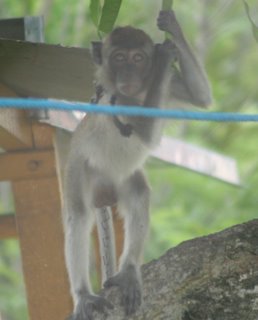
The following is the original text of an article I wrote that appeared in edited form in The Star (Star Weekend, Nov. 5.)
Think twice before you buy or adopt a monkey as a pet – and then don’t do it. That’s the consensus of animal experts.
As development into forests brings monkeys, primarily long-tailed macaques (kera), and humans into increased contact, more simians than ever before are turning up in cages or on chains in residential areas.
“I personally do not believe people should keep monkeys as pets,” Misliah Mohamed Basir, Director of the Law and Enforcement Division of the Department of Wildlife and National Parks, told The Star. Her office has the authority to issue licenses for keeping captive monkeys, along with other wild animals, but Misliah would like to see that change.
“I understand why people are attracted to them,” she said. “They are cute and playful when they are babies. They remind us of humans. But when they grow up, they become strong, wilful and aggressive. They can be quite dangerous. Nothing can be done about the monkeys currently being kept legally as pets, but perhaps the law should be changed in the future. The government could stop issuing new monkey licenses, except in special cases, such as the use of pig-tailed macaques for harvesting coconuts in some areas.”
She told us that some people, frustrated by the difficulty of keeping an adult monkey, dump the animals on the DWNP, thinking the monkeys will be relocated into the jungle or kept in a sanctuary. “We have no place to keep them,” Misliah said. “We send them to our rescue facility at Zoo Melaka.”
At Zoo Melaka, however, The Star discovered there is no rescue awaiting the unwanted monkeys. “If they send the monkeys to us,” Dr. Choong Siew Shean, the Zoo’s veterinary officer, told us, “we euthanize them.”
The zoo has no room for them and no rehabilitation programme. “Monkeys are extremely difficult to rehab and re-release into the wild,” Dr. Choong explained. “They live in social groups that are unlikely to accept an outsider. Even if we could retrain a captive monkey to live in the wild, when we released him, he would be attacked by the existing troops and find it hard to survive.”
Neither does she see a semi-captive sanctuary as a viable alternative. “Our resources in terms of time, space, manpower and funding are limited,” she said, “and long-tailed macaques are not a priority. They are so common in Malaysia that they are generally considered a pest animal. In fact, we chase the wild ones out of the zoo, from concern for public safety.”
That brings up another problem with keeping captive monkeys. “They are a health risk to humans,” Dr. Choong said. “Not only do monkeys bite and scratch, but they can carry and pass on zoonotic diseases such as hepatitis and herpes-B to humans. It is not safe to keep them in residential areas.”
Occasionally, a monkey turned over to the Zoo may find a home with a staffer, but the issue remains the same – adult monkeys are extremely difficult to keep humanely.
That’s a problem that infuriates Sabrina Yeap, the Animal Investigator for the SPCA. She has seen many heart-breaking cases in the course of her work. “Do you know what happens when a monkey outgrows its cuteness?” she demanded of us. “It gets big and strong and fierce, so it gets locked in a cage all day or tied with a heavy chain. Some people don’t even give the monkey shelter from the sun and rain. The owner ends up beating the monkey repeatedly in a futile attempt to ‘tame’ it. It drags out a miserable life of boredom, frustration and pain in solitary confinement.”
Sabrina would like to see a ban on keeping monkeys as pets, a sanctuary for those who are confiscated from current owners and a change in the public attitude towards monkeys. She decries the labelling of monkeys as “pests.”
“Do the monkeys move into our houses and kick us out? Do they destroy our homes? No, it’s the other way around. Developers push deeper and deeper into their habitat, cutting down forests to build golf courses and housing developments, and the monkeys have nowhere to go. Then people move in and say ‘Oh, those monkeys are such pests!’ but it’s the other way around. We are the pests. We encroach into their natural homes and then blame them for intruding on us.”
She believes the solution is to make the developers responsible for relocating the monkeys (and the other animals dispossessed by development, such as snakes and lizards.) She has heard of such programmes in Europe. “They create a green passageway to another area where the animals can live, and then they use smoke to herd the wildlife from the development site to their new home. That way, they don’t have to try to do the impossible and catch every single monkey, snake, rabbit, whatever.”
She has an ally in Misliah. “Personally, I would like to see the developers have to do an Animal Impact Assessment,” Misliah told us, “similar to the Environmental Impact Assessment they already do. It should be part of their planning, part of the cost of the project.”
Meanwhile, as population pressure spurs more development, and development brings urban people into more and more contact with monkeys, it increases the risks both to humans – of disease and injury – and to the monkeys – of capture, imprisonment and mistreatment, usually based more on ignorance than ill will.
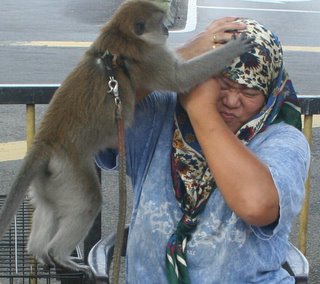
Manja gets rowdy with his "mom" after a day of hanging out on the sidewalk with not much to do. He likes to try to pull off her head scarf (tudung) when he can.
Nadhirah Yap Bt Abdullah and her pet monkey, Manja, are a well-known sight on the sidewalk in Bangsar where Nadhirah and her husband operate a food stall. Manja appears to be a healthy, well-developed two-year-old monkey treated with great affection and a high degree of empathy by his human ‘mother.’
Nadhirah tells Manja’s story:
“I remember the exact day I first met Manja. It was May 13, 2003. My husband and I were driving home through Rawang, and we stopped to get some dinner. I saw this tiny black monkey, sitting on the ‘Do Not Enter’ sign all alone. He was so hungry, he came right to me when I offered him food. I thought he must’ve escaped from someone’s home, so we waited there for over an hour, but no-one came looking for him, so we took him home with us.
I know he needs exercise and affection and entertainment, so I do my best to give him those things. Sometimes, people come up and scold me, saying, ‘How would you like it if I put a leash on you and kept you that way?’ but they don’t understand. I couldn’t leave him to die as a baby, and he can’t go back into the wild now. He depends on us completely. I have raised him like my own son.
I bring him with me to work every day. He loves to bath, so we keep a big barrel of water next to him. He bathes at least twice a day. I put up a garden umbrella to shelter him from the sun and the rain. He likes to eat fruit – durian is his favourite, that’s why he’s a bit fat – and veggies, especially small onions. I give him a garlic pill every morning for his health. He’s only been sick once, and I took him straight to the vet for treatment.
At home, Manja has a large cage to stay in. We can’t let him roam free in the flat, because he would turn everything upside down. Like a child at bedtime, he delays going into the cage in the evening by begging us for more attention. He especially loves to have his tummy rubbed. Now that he’s getting older, he’s becoming a bit stubborn and aggressive. He has bitten my husband a few times. Sometimes, I have to whack him with a rotan.
We know that he is lonely for other monkeys and should have a female for companionship, but what can we do? I have considered sending him to a zoo, but my husband always says no. He says, ‘You don’t what will happen to him there. They might put him to sleep or even feed him to the tigers.’ [In fact, Manja would be euthanized. See main story.]
I feel that God brought us there that night to rescue this monkey. It was fate. I have to take care of him for the rest of his life. I love him very much, but I don’t think people should run out and buy monkeys from pet shops. We can’t even go out as a family because we don’t like to leave him by himself. Keeping a monkey is not something to undertake on a whim. It’s a huge commitment and very hard work.”
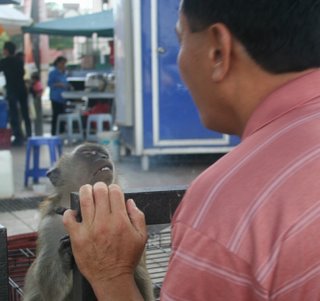
Manja, like other captive primates, has been introduced to some bad human habits. He was quite keen to inhale the cigarette smoke blown into his face by one of his regular visitors.
Risky Business
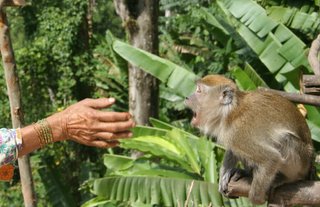 A frightened or angry monkey, like this one I saw being teased in Cameron Highlands by one of her keepers, can be dangerous.
A frightened or angry monkey, like this one I saw being teased in Cameron Highlands by one of her keepers, can be dangerous.
Humans risk catching a number of diseases and infections from monkeys, including hepatitis, herpes-B, salmonella, measles, monkeypox, rabies and tuberculosis.
If that’s not scary enough, how about this? There is evidence that HIV-1, the virus that causes AIDS, developed from two monkey viruses and spread to humans via contact with chimpanzees. The less virulent HIV-2 was apparently transmitted to humans directly from monkeys. Who knows what might cross over next? Is it worth the risk?
A Case of Cruelty
I witnessed a sad case of monkey abuse in my own neighbourhood several years ago. It was my first glimpse of the plight of monkeys in Malaysia. (See my previous post, The Monkey Man.)
An Indonesian man and his family were living as squatters in an abandoned house near my home. The monkey was kept chained to a wooden telephone wire spool, which provided his only shelter. The only other thing near him was a small tree he could climb a little way up into. He was surrounded by garbage and his own waste. I observed both the man and his young son beat the monkey with sticks and threaten him with a parang. Despite all the abuse this monkey had suffered, I was able over time and with great caution to make friends with him. On one very special day, I mimed picking lice from his back, and he returned the favour by rolling up my sleeve and trying to pluck the freckles from my arm. I offered to buy the monkey from the man, but he refused. I also tried to persuade him to treat the monkey more humanely, to no avail. Finally, I reported the case to the Department of Wildlife and National Parks. At that time, like most people, I did not know they would destroy him. Nothing happened then, but later, in response to more complaints from others, the DWNP confiscated the monkey. I assume now that he was euthanized. It breaks my heart.
An additional note: I recently went to a pet shop that specialized in birds and was told, on enquiring, that they could get me a baby macaque, long-tailed (RM 300) or pig-tailed (RM 600), if I placed an order. On my asking if the monkeys were captive-bred, I was told by the owner that, on the contrary, their man chased the mothers in the jungle until they frightened them into dropping their babies. Or worse, I imagine.
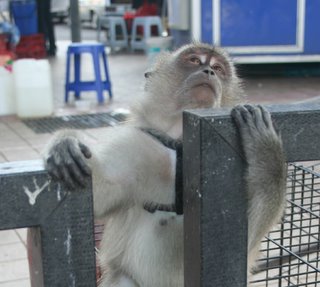 Manja, half-asleep in the late afternoon, watches the crows gather in the trees over his head. I wonder if he was envying, or at least contemplating, their freedom.
Manja, half-asleep in the late afternoon, watches the crows gather in the trees over his head. I wonder if he was envying, or at least contemplating, their freedom.







2 Comments:
Hello Leah,
congrats on finishing up nanowrimo! well done girl! Also safe travels back to the US and do keep in touch.
Sham
shamalasp@yahoo.com
In your blog, the Dept of Wildlife and National Parks seems to be protrayed as heartless towards these long-tailed macaques. I would like to clarify that we do not euthanize the monkeys immediately after receiving them in Melaka Zoo (even SPCA can't keep all strays forever). We will provide goof food and shelter, lots of times for months, hoping that the owner(s) would apply for license and take back their primate friends. Sadly, many owners don't, and as a last resort we had to put them down. I feel this would be better than just releasing them into the forest, leaving them to fend for themselves, probably killed by its own kind as it does not belong in the group; or wander into housing areas and being chased, beaten, there were even cases of shot and slashed by a parang (long knife). We would like to urge macaques owners to apply for license, and if they were confiscated, just pay the compound and get a lisence, it is not expensive, considering it has been your pet and it is a living being.
Post a Comment
<< Home